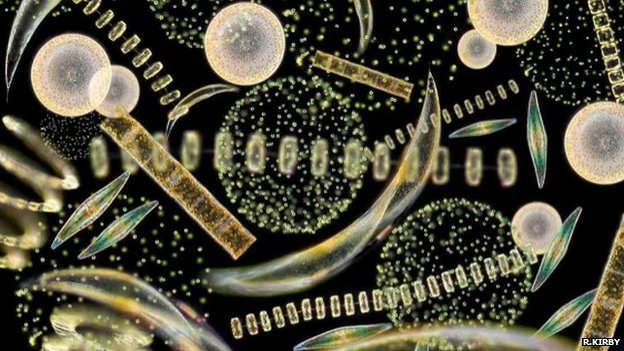Marine Life & Conservation
App Set To Match The Oceans’ Plankton

A study is calling on the world’s sailors to help map the oceans’ phytoplankton, microscopic plants that form the bedrock of marine food chains.
Researchers have developed an app for people to submit readings from Secchi disks – a method used since 1865.
The team hopes the data will help them understand what is happening beneath the waves.
They have been “astonished” by the response so far but are hoping for more readings from the southern hemisphere.
“The reason the project came about was because, in 2010, some Canadian scientists wrote a paper that suggested that the phytoplankton in the world’s oceans had declined by 40% since the 1950s,” explained project leader Richard Kirby, a research fellow at Plymouth University’s Marine Institute.
“If true, this is a dramatic decline. As phytoplankton starts the food chain, they dictate the productivity at every level above,” he observed.
“Ultimately, phytoplankton determines the amount of fish in the sea and the number of polar bears on the ice.”
Marine biologists have been using the Secchi disk method to measure the abundance of phytoplankton for 150 years.
The white disk measures 30cm (1ft) in diameter and is lowered into the water on the end of a tape measure. When it is no longer visible from the surface, the reading – known as the Secchi depth – is recorded.
“It is a very robust method and not prone to error and it is a good measure of phytoplankton abundance,” said Dr Kirby.
“Away from estuaries and more than a kilometre from the coast, the main influence on water clarity is phytoplankton.”
He explained how he had the idea of setting up a citizen science project: “It occurred to me sat at my desk that while there are a lot of scientists, there are not that many that are marine scientists, and fewer still that go to sea.
“And the ones that do go to sea do not go out very far. If they do go out far, they rarely go back to the same place.
“I thought that there are an awful lot of sailors out there; day sailors, cruising sailors. Many of these sailors will sail the same waters and take the same route time and time again.”
Dr Kirby, and colleagues Drs Nicholas Outram and Nigel Barlow from the University’s School of Computing and Mathematics, developed the Secchi Disk App that would store a reading while at sea before uploading it to a database once the smartphone was back within range of a mobile phone network.
“We can now collect Secchi depth measurements from all over the world’s oceans and add that to the data from the 1860s to make a continuous – with a slight dip – record to see what is happening to the phytoplankton in the oceans,” he said.
The database, managed by Dr Sam Lavender, is accessible, free-of-charge, from the project’s website.
The reason for collecting measurements via the Secchi method, Dr Kirby explained, was because the Canadian team’s findings proved to be quite controversial among scientists.
“Some said that they did not see any similar decline, while others said they saw an increase rather than a decline,” he said.
The study was criticised because it combined Secchi disk measurements with data gathered using modern technology that became available to scientists in the late 20th Century.
Despite the criticism, the authors have defended their findings, saying the dramatic decline was a result of sea surface temperature.
“They said that the warming had increased stratification so fewer nutrients were reaching the oceans’ surface, and so there was less phytoplankton growth,” Dr Kirby said.
He added that in the waters around UK shores, observations showed that phytoplankton were appearing at different times of the year.
He said that changes in the seas’ seasons had potential consequences for life beneath the waves.
“This is changing the coupling in the marine ecosystem. Evolutionarily, everything is synchronised – just as it is on land.
“When the timings start altering, even by just a fraction, then things no longer work through the food chain.”
To help raise awareness of the vital role phytoplankton plays in marine and terrestrial food chains, Dr Kirby has written and produced a short film called Ocean Drifters, which has been sent to every secondary school in England.
Narrated by Sir David Attenborough, the film also explains how plankton is responsible for the familiar smell of “sea air”, and how the tiny organisms are involved in the formation of clouds.
Source: www.bbc.co.uk/news
Photo: Richard Kirby
Marine Life & Conservation
Double Bubble for Basking Sharks

 The Shark Trust is excited to announce that, for two more days only, all donations, large or small, will be doubled in the Big Give Green Match Fund!
The Shark Trust is excited to announce that, for two more days only, all donations, large or small, will be doubled in the Big Give Green Match Fund!
Donate to Basking in Nature: Sighting Giants
The Shark Trust is hoping to raise £10k which will be doubled to £20k. This will go towards Basking in Nature: Sighting Giants. And they need YOUR help to reach they’re goal.
The Shark Trust’s citizen science project is to monitor and assess basking sharks through sightings; encouraging data collection, community engagement, and promoting nature accessibility. This initiative aims to enhance health and wellbeing by fostering a deeper connection with British Sharks.
Campaign Aims
- Increase citizen science reporting of Basking Sharks and other shark sightings to help inform shark and ray conservation.
- Provide educational talks about the diverse range of sharks and rays in British waters and accessible identification guides!
- Create engaging and fun information panels on how to ID the amazing sharks and rays we have on our doorstep! These can be used on coastal paths around the Southwest. With activities and information on how you can make a difference for sharks and rays!
- Promote mental wellbeing through increasing time in nature and discovering the wonders beneath the waves!
Donate, and double your impact. Click Here
Marine Life & Conservation
Leading UK-based shark conservation charity, the Shark Trust, is delighted to announce tour operator Diverse Travel as a Corporate Patron

 Corporate Patrons provide a valuable boost to the work of The Shark Trust. The Trust team works globally to safeguard the future of sharks, and their close cousins, the skates and rays, engaging with a global network of scientists, policymakers, conservation professionals, businesses and supporters to further shark conservation.
Corporate Patrons provide a valuable boost to the work of The Shark Trust. The Trust team works globally to safeguard the future of sharks, and their close cousins, the skates and rays, engaging with a global network of scientists, policymakers, conservation professionals, businesses and supporters to further shark conservation.
Specialist tour operator Diverse Travel has operated since 2014 and is committed to offering its guests high quality, sustainable scuba diving holidays worldwide. Working together with the Shark Trust will enable both organisations to widen engagement and encourage divers and snorkellers to actively get involved in shark conservation.
“Sharks are truly at the heart of every diver and at Diverse Travel, we absolutely share that passion. There is nothing like seeing a shark in the wild – it’s a moment that stays with you forever!” says Holly Bredin, Sales & Marketing Manager, Diverse Travel.
“We’re delighted to celebrate our 10th year of business by becoming a Corporate Patron of the Shark Trust. This is an exciting partnership for Diverse and our guests. We will be donating on behalf of every person who books a holiday with us to contribute towards their vital shark conservation initiatives around the world. We will also be working together with the Trust to inspire divers, snorkellers and other travellers to take an active role – at home and abroad – in citizen science projects and other activities.”
Paul Cox, CEO of The Shark Trust, said:
“It’s an exciting partnership and we’re thrilled to be working with Diverse Travel to enable more divers and travellers to get involved with sharks and shark conservation. Sharks face considerable conservation challenges but, through collaboration and collective action, we can secure a brighter future for sharks and their ocean home. This new partnership takes us one more valuable step towards that goal.”
For more information about the Shark Trust visit their website here.
For more about Diverse Travel click here.
-

 News3 months ago
News3 months agoHone your underwater photography skills with Alphamarine Photography at Red Sea Diving Safari in March
-

 News3 months ago
News3 months agoCapturing Critters in Lembeh Underwater Photography Workshop 2024: Event Roundup
-

 Marine Life & Conservation Blogs2 months ago
Marine Life & Conservation Blogs2 months agoCreature Feature: Swell Sharks
-

 Blogs2 months ago
Blogs2 months agoMurex Resorts: Passport to Paradise!
-

 Blogs2 months ago
Blogs2 months agoDiver Discovering Whale Skeletons Beneath Ice Judged World’s Best Underwater Photograph
-

 Gear Reviews3 months ago
Gear Reviews3 months agoGear Review: Oceanic+ Dive Housing for iPhone
-

 Marine Life & Conservation2 months ago
Marine Life & Conservation2 months agoSave the Manatee Club launches brand new webcams at Silver Springs State Park, Florida
-

 News3 months ago
News3 months agoWorld’s Best Underwater Photographers Unveil Breathtaking Images at World Shootout 2023


















